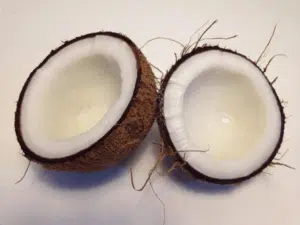Coconut Oil Nutritional and Health Benefits

Coconut oil products fill the shelves of health food stores but what’s with all the hype? Is coconut oil truly a superfood? Or is it just a clever marketing ploy?
Pressed from the nut (or technically, a drupe) of the coconut tree, this tropical oil’s main uses are in cosmetic products and as a cooking oil. Furthermore, it’s promoted for its health benefits. Fans of coconut oil rave about its nutty flavor and it seems to be the new ‘cure-all’ health food.
However, should we be skeptical about coconut oil? Is it nutritious and what are the real benefits for your body? Let’s have a look at the claims for coconut oil and determine if there’s any scientific truth behind it.
Is Coconut Oil Healthy?

For a healthy balanced diet, fat is an essential part and coconut oil is a great source of healthy dietary fats. Fats are needed by the body to absorb fat-soluble vitamins including A, D, E, and K which all perform important functions in the body. 1
Virgin coconut oil is deemed to be the best oil to consume as it’s higher in antioxidants than refined coconut oil. Compared to other vegetable oils, soy, corn, and palm, coconut oil has the least amount of cholesterol. 2
Yes, coconut oil contains saturated fats – those fats we are told are ‘bad’ fats. But coconut oil’s saturated fatty acids are of medium chain length, unlike other dietary fats which are long chain fatty acids.
What makes medium chain fatty acids (MCFAs) different is they get absorbed more efficiently and metabolized directly by the liver and they are more readily converted in the body to produce energy. Unlike long chain fatty acids (LCFAs), MCFAs are not stored as fat. 3
MCFA (Medium Chain Fatty Acids): What Makes Them a “Healthier” Fat?
The content of MCFAs in coconut oil is 60% of its total composition. 4 The main medium chain fatty acids in coconut oil are:
- Caprylic acid
- Lauric acid
- Capric acid
There are many reasons that MCFAs are healthier fatty acids than long chain fatty acids. MCFAs are turned into an energy source for the body directly by the liver. The resulting ketones are used as an energy source for the brain.
MCFAs are not stored in the body as fat deposits. They help balance out gut bacteria and promote heart health. The main fatty acids in coconut oil have proven antiviral, antioxidants, anti-inflammatory, and antimicrobial effects.
Coconut Oil’s Possible Health Benefits

Since coconut oil is touted as having numerous health benefits, here’s a roundup of what science says are the main benefits of coconut oil.
Heart Health
Studies are limited on humans and coconut oil with relation to heart health and lowering the risk of cardiovascular disease. The heart benefits of virgin coconut oil focus on its ability to raise HDL cholesterol levels and preventative action on LDL cholesterol oxidation. 5
One three month study of 116 adults with a pre-existing coronary disease showed an increase in HDL cholesterol taking a daily dose of 13 ml of extra virgin coconut oil in their diet. In this study, participants also saw a reduction in waist size and body mass index (BMI). 6
An animal study also showed the potential cardioprotective properties of coconut oil as it prevents blood pressure from increasing via the antioxidant action of coconut oil. 7
Coconut oil seems effective at increasing HDL cholesterol levels. Increasing this good cholesterol in your body can help lessen your risk for heart disease.
Alzheimer’s Disease
The link between a diet with coconut oil and the potential benefits of helping those suffering from Alzheimer’s disease has been researched. Coconut oils MCFAs provide energy via the liver as ketones which could be an alternative energy source for brain function. 8 9
One clinical trial where participants had a twice daily dose of 20 ml of coconut oil found it helps improve cognitive abilities in orientation and language-construction areas in Alzheimer’s patients. 10
Further investigation is needed into the role of coconut oil and Alzheimer’s disease but the small clinical trials that have been done already see a promising potential for coconut oil to help improve cognitive abilities.
Weight Loss

The addition of coconut oil in your diet could help reduce abdominal body fat. Coconut oil seems to suppress your appetite meaning your daily caloric count is lowered. Although coconut oil is a fat, its MCFAs are quickly converted to energy rather than being stored as fat in the body.
Clinical trials on the effect of medium chained fatty acids in lowering body mass showed favorable results in increased energy expenditure and reduced body weight. 11 12
One recent study with obese volunteers who had a daily dose of 30 ml of virgin coconut oil for four weeks had a similar outcome. The results showed a reduction in abdominal fat for male volunteers whose waist measurements were reduced by nearly 5cm. Another study on females with abdominal obesity resulted in the group taking coconut oil supplementation seeing a reduction in waist circumference. 13 14
Other studies show the effect of virgin coconut oil on decreasing appetite in females – in particular that coconut oil showed a feeling of fullness. 15
Coconut oil doesn’t have a hugely dramatic effect on weight loss except for reducing belly fat and its ability to help burn fat and reduce calorie intake. Participants also experienced an increase energy – which may help motivate those individuals trying to lose weight.
Helps Fight Oral Plaque and Gum Disease

The Ayurvedic practice of ‘oil pulling’ has gained popularity in the western world. The principle is ‘swishing’ oil in the mouth to improve oral health, predominantly the reduction of plaque and gum disease.
A study of adolescents, aged 16-18 years, used coconut oil over a 30 day period in their oral hygiene routine. The outcome showed that coconut oil reduced plaque build-up after 7 days and continued. Coconut oil was deemed a safe and cheaper alternative to commercial mouthwashes and effective in reducing plaque and gingivitis. 16
Another study showed ‘oil pulling’ with coconut oil to reduce the presence of Streptococcus mutans in saliva. This acid-producing bacteria is known to be a cause of dental enamel damage and lead to tooth decay. The study outcome showed coconut oil significantly reduced the bacteria in the mouth and should be promoted as a preventive use in oral hygiene. 17 18
Fights Bacterial and Yeast Infections
Bacteria’s resistance to antibiotics is more common today and science is always looking for new ways to fight bacterial infections. Taking coconut oil daily as a supplement might be useful in combating bacterial infections.
Capric acid, one of the medium chain fatty acids found in coconut oil, is seen to be effective at inhibiting the growth of candida albicans. Another fatty acid in coconut oil, lauric acid, has shown that it has an ability to kill candida albicans and therefore may be a useful treatment in infections caused by this fungal bacteria. 19 20
Yeast infections can be very uncomfortable, and coconut oil products have been developed to relieve vaginal fungal infection caused by candidiasis. 21
Clinical studies of coconut oil’s antibacterial and antifungal properties against candida species found it more effective than compared to fluconazole. The laboratories’, outcome prompted them to say:
“Coconut oil should be used in the treatment of fungal infections in view of emerging drug-resistant Candida species.” 22
The antimicrobial properties of coconut oil have also shown to be effective against staphylococcus aureus and Escherichia coli bacteria. 23
Helpful for Skin Conditions
Topical application of coconut oil for healthy skin goes beyond just a beauty product. Coconut oil’s anti-inflammatory and antibacterial properties help with dermatitis, acne, and eczema.
The high lauric acid content found in coconut oil has a strong antibacterial effect on acne vulgaris. Lauric acid studies have shown it effective at killing bacteria linked to acne. 24
Coconut oil was compared to olive oil in a clinical study of atopic dermatitis. Staphylococcus aureus (SA) bacteria was present in 20 participants of the trial and the outcome of those who had coconut oil topically applied showed not only was skin moisturized but SA bacteria was reduced. 25
Other studies compared coconut oil to mineral oil for application in the treatment of atopic dermatitis over eight weeks. Again, coconut oil was superior with 46% of patients showing excellent improvements. 26
Coconut oil seems to be good for treating eczema; one trial showed significant improvement in skin dryness, scaling, and inflammation. 27
Coconut Oil Controversy (Saturated Fat)

Coconut oil hit the headlines in July 2017 when the AHA (American Heart Association) published a damning statement on saturated fats in diet. The AHA isn’t saying no saturated fats in our diets but a recommendation to reduce daily intake to 30g for men and 20g for women.
In the report the AHA stated: “We advise against the use of coconut oil.” 28
This advice is because coconut oil increases LDL cholesterol which the AHA believe leads to heart disease. Yet studies and research have shown that coconut oil raises HDL ‘good cholesterol’ which the AHA report did not mention. 29 30
Research has also noted the link between LDL cholesterol and heart disease shows contrasting results. This ponders the question of who is right and are all saturated fats the same? 31
Side Effects of Coconut Oil
Coconut oil has proved safe and non-harmful for human consumption.
Side effects are rare and no indications with medications have been noted. If in doubt, seek the advice of your doctor prior to adding coconut oil to your diet routine.
A derivative of coconut oil used in household cleaners and hand cleaners may cause irritation with some individuals. 32
Conclusion
The bottom line is all fats should be consumed in moderation for a healthy balanced diet. The recommended daily allowance of saturated fats is equal to two tablespoons of coconut oil.
There is definitely room for coconut oil as a supplement in nutritional health. It’s best to use virgin cold pressed coconut oil; refined or processed oils should be avoided as the production process may have damaged the benefits of the fats.
Coconut oil seems to be good for our health. Research shows a potential for coconut oil to help prevent illness and disease. Further study is required to understand the complexity of coconut oil and its natural healing properties.
Source
- http://nutritiondata.self.com/facts/fats-and-oils/508/2
- http://www.tandfonline.com/doi/abs/10.1080/15376516.2017.1320458?journalCode=itxm20
- https://www.cabi.org/gara/FullTextPDF/2009/20093019388.pdf
- https://www.ncbi.nlm.nih.gov/pmc/articles/PMC4283167/
- https://www.ncbi.nlm.nih.gov/pubmed/15329324
- https://www.ncbi.nlm.nih.gov/pubmed/26545671
- https://www.ncbi.nlm.nih.gov/pubmed/25853965
- https://www.ncbi.nlm.nih.gov/pmc/articles/PMC4937039/
- https://www.cambridge.org/core/journals/british-journal-of-nutrition/article/role-of-dietary-coconut-for-the-prevention-and-treatment-of-alzheimers-disease-potential-mechanisms-of-action/1C610ECEA7E7D7CD3E7323A0477E6731
- https://www.ncbi.nlm.nih.gov/pubmed/28421789
- https://www.ncbi.nlm.nih.gov/pubmed/12975635
- https://www.ncbi.nlm.nih.gov/pubmed/8654328
- https://www.ncbi.nlm.nih.gov/pmc/articles/PMC3226242/
- https://www.ncbi.nlm.nih.gov/pubmed/19437058
- https://www.ncbi.nlm.nih.gov/pubmed/28405814
- https://www.ncbi.nlm.nih.gov/pmc/articles/PMC4382606/
- https://www.ncbi.nlm.nih.gov/pubmed/27084861
- https://www.ncbi.nlm.nih.gov/pmc/articles/PMC3257652/
- https://www.ncbi.nlm.nih.gov/pubmed/26781922
- https://www.ncbi.nlm.nih.gov/pmc/articles/PMC90807/
- https://www.ncbi.nlm.nih.gov/pubmed/24503350
- https://www.ncbi.nlm.nih.gov/pubmed/17651080
- https://www.ncbi.nlm.nih.gov/pubmed/23971051
- https://www.ncbi.nlm.nih.gov/pubmed/19665786
- https://www.ncbi.nlm.nih.gov/pubmed/19134433
- https://www.ncbi.nlm.nih.gov/pubmed/24320105
- https://www.ncbi.nlm.nih.gov/pubmed/15724344
- http://circ.ahajournals.org/content/early/2017/06/15/CIR.0000000000000510
- https://www.ncbi.nlm.nih.gov/pmc/articles/PMC5001225/
- https://www.ncbi.nlm.nih.gov/pubmed/26545671
- http://www.thelancet.com/journals/lancet/article/PIIS0140673601055532/abstract
- https://www.ncbi.nlm.nih.gov/pubmed/24588369
This is our guide to coconut oil. Check out our other installments:
Which Coconut Oil Should You Buy?